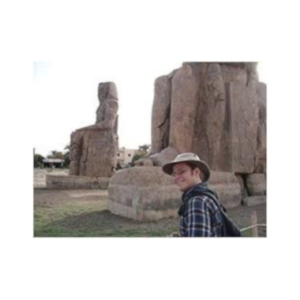Thomas Landvatter
- Fellowship Dates 2012-2012
- Research Topic Identity, Burial Practices and Social Change in Greco-Roman Egypt
- Fellow or Grant Type Bureau of Educational and Cultural Affairs
- Affiliation Pre-doctoral candidate University of Michigan
Egypt during the Greco-Roman period (c. 300 BCE to 300 CE) is one of the most compelling cases of sustained cross-cultural interaction in an ancient context – and one of the most understudied. From the conquest of Alexander the Great in 332 BCE onward, Egypt was under the control of a small non-indigenous elite – first by the Macedonian Greek Ptolemaic dynasty and then as a province of the Roman Empire. As one of the earliest complex state-level societies, Egypt had a highly developed sociopolitical culture of its own and a material culture with a long and very conservative tradition, especially relating to the materials of political and religious ideologies. The Greco-Roman period saw the influx of a sizable non-Egyptian population and the first mass introduction of a non-indigenous material culture and traditions.
This research explores issues of identity and culture change in the context of cross-cultural contact during this period via an analysis of regional and diachronic variability in mortuary practice across a number of different cemetery sites. It examines social identities and distinctions as the Egyptians represented these in mortuary behavior on four different spatial levels: individual, site specific, regional and Egypt-wide. The study analyzes bioarchaeological data, treatment of the body, the burial assemblage, resource expenditure and spatial organization of the cemeteries at five different sites, including Abydos, Alexandria, Dush and Kellis in the Dakhla oasis, cemeteries in the Bahariya oasis, Terenouthis (modern Kom Abou Billou) and Thebes. While the burial practices of pharaonic Egypt are well-known and have been extensively studied, comparatively little attention has been paid to the traditions of the Greco-Roman era. This research fills the lacuna and adds to the scholarship on cultural change and identity in Egypt during the Greco-Roman era.
